
Helene Bertha Amalie "Leni" Riefenstahl was a German film director, producer, writer, editor, photographer and actress. She is considered one of the most controversial personalities in film history. On the one hand, she is regarded by many critics as an "innovative filmmaker and creative aesthete", while on the other hand she is criticized for her works in the service of propaganda during the Nazi era.

Kristallnacht (German pronunciation:[kʁɪsˈtalnaχt]lit. 'crystal night') or the Night of Broken Glass, also called the November pogrom(s) (German: Novemberpogrome, pronounced[noˈvɛm.bɐ.poˌɡʁoːmə] ), was a pogrom against Jews carried out by the Nazi Party's Sturmabteilung (SA) and Schutzstaffel (SS) paramilitary forces along with some participation from the Hitler Youth and German civilians throughout Nazi Germany on 9–10 November 1938. The German authorities looked on without intervening. The euphemistic name Kristallnacht comes from the shards of broken glass that littered the streets after the windows of Jewish-owned stores, buildings, and synagogues were smashed. The pretext for the attacks was the assassination, on 9 November 1938, of the German diplomat Ernst vom Rath by Herschel Grynszpan, a 17-year-old German-born Polish Jew living in Paris.
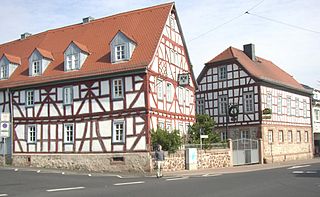
Altenstadt is a municipality in the district Wetteraukreis, in Hesse, Germany. It is situated in the Nidder valley, approx. 27 kilometers north-east of Frankfurt am Main.

Jonas Mekas was a Lithuanian-American filmmaker, poet, and artist who has been called "the godfather of American avant-garde cinema". Mekas's work has been exhibited in museums and at festivals worldwide. Mekas was active in New York City, where he co-founded Anthology Film Archives, The Film-Makers' Cooperative, and the journal Film Culture. He was also the first film critic for The Village Voice.

Reductio ad Hitlerum, also known as playing the Nazi card, is an attempt to invalidate someone else's argument on the basis that the same idea was promoted or practised by Adolf Hitler or the Nazi Party. Arguments can be termed reductio ad Hitlerum if they are fallacious. Contrarily, straightforward arguments critiquing specifically fascist components of Nazism like Führerprinzip are not part of the association fallacy.
This is a selected bibliography and other resources for The Holocaust, including prominent primary sources, historical studies, notable survivor accounts and autobiographies, as well as other documentation and further hypotheses.

Victor Klemperer was a German literary scholar and diarist. His journals, published posthumously in Germany in 1995, detailed his life under the German Empire, the Weimar Republic, the fascist Third Reich, and the communist German Democratic Republic.
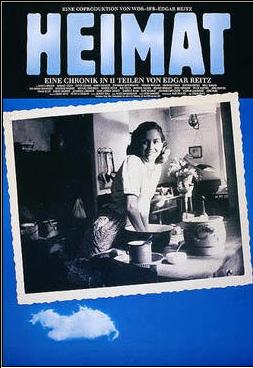
Heimat is a series of films written and directed by Edgar Reitz about life in Germany from the 1840s to 2000 through the eyes of a family from the Hunsrück area of the Rhineland-Palatinate. The family's personal and domestic life is set against the backdrop of wider social and political events. The combined length of the 5 films — broken into 32 episodes — is 59 hours and 32 minutes, making it one of the longest series of feature-length films in cinema history.
The Holocaust has been a prominent subject of art and literature throughout the second half of the twentieth century. There is a wide range of ways–including dance, film, literature, music, and television–in which the Holocaust has been represented in the arts and popular culture.
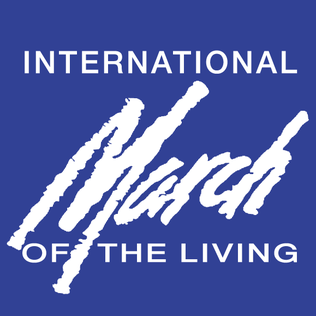
The March of the Living is an annual educational program which brings students from around the world to Poland, where they explore the remnants of the Holocaust. On Holocaust Memorial Day observed in the Jewish calendar, thousands of participants march silently from Auschwitz to Birkenau.

The Paper Clips Project, by middle school students from the small southeastern Tennessee town of Whitwell, created a monument for the Holocaust victims of Nazi Germany. It started in 1998 as a simple 8th-grade project to study other cultures, and then evolved into one gaining worldwide attention. At last count, over 30 million paper clips had been received.
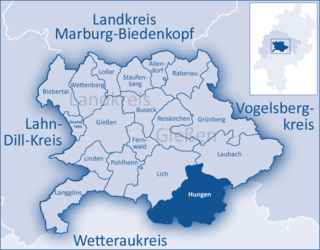
Hungen is a town in the district of Gießen, in Hesse, Germany. It is situated 20 km southeast of Gießen, and 18 km northeast of Friedberg. Surrounding towns are Laubach to the north, Nidda to the east, Wölfersheim to the south, and Münzenberg and Lich to the west.

Laubach is a town of approximately 10,000 people in the Gießen region of Hesse, Germany. Laubach is known as a Luftkurort, a climatic health resort. It is situated 23 kilometres (14 mi) east of Gießen. Surrounding Laubach are the towns of Hungen, Grünberg, Schotten and Lich.
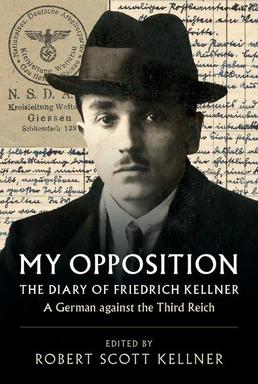
My Opposition is a diary secretly written by the German social democrat Friedrich Kellner (1885–1970) during World War II to describe life under Nazi Germany and to expose the propaganda and the crimes of the Nazi dictatorship. Comprising ten notebooks, it is considered by leading historians as "an important piece of historical literature." The editors of the German magazine Der Spiegel called it "an image of Nazi Germany that has never existed before in such a vivid, concise and challenging form." Kellner began his 861-page diary on September 1, 1939, and wrote his last entry on May 17, 1945.
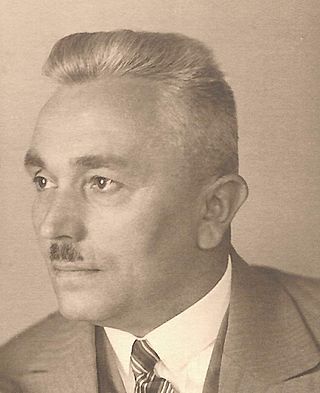
August Friedrich Kellner was a German mid-level official and diarist who worked as a justice inspector in Laubach from 1933 to 1945.

Rut "Rutka" Laskier was a Jewish Polish diarist who is best known for her 1943 diary chronicling the three months of her life during the Holocaust in Poland. She was murdered at Auschwitz concentration camp in 1943 at the age of fourteen. Her manuscript, authenticated by Yad Vashem, was published in the Polish language in early 2006. English and Hebrew translations were released the following year. It has been compared to the diary of Anne Frank.

Anti-Jewish legislation in pre-war Nazi Germany comprised several laws that segregated the Jews from German society and restricted Jewish people's political, legal and civil rights. Major legislative initiatives included a series of restrictive laws passed in 1933, the Nuremberg Laws of 1935, and a final wave of legislation preceding Germany's entry into World War II.

Petra Seeger is a German documentary film director and producer. Her 2008 documentary film, In Search of Memory: The Neuroscientist Eric Kandel explores the life of Eric Kandel, a Nobel Prize winning Austrian-born Jewish-American neuroscientist whose research focused on learning and memory.

Mariusz Kotowski is a Polish-born writer and director. As a director, he has gained a reputation for cinematic portrayals that are atypical of both Hollywood and independent film styles and that cleverly mix different film approaches into a cohesive whole.
















